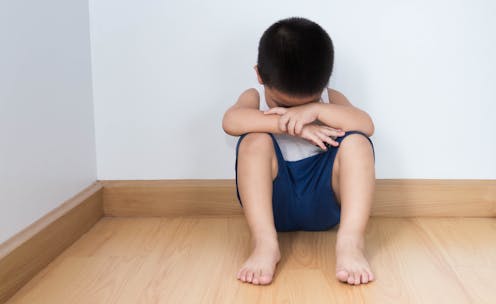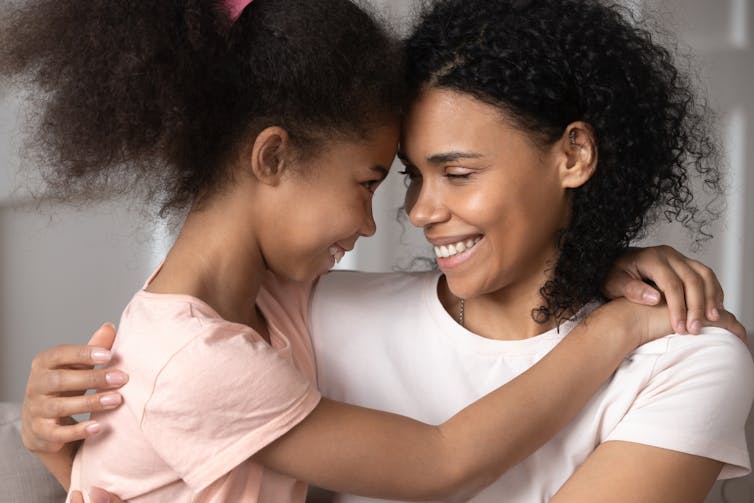
Harsh words can wound – and when directed at children, they can have a lifelong impact.
Research has shown that when words are routinely used by the adults in their lives to humiliate, shame or control children, they can alter the developing brain. A 2023 study of over 20,500 UK adults found that one in five reported having been verbally abused as children.
Definitions of verbal abuse vary, but it is generally characterised by a sustained pattern of behaviour where criticism, threats or rejection of the child leads them to feel routinely belittled, blamed, threatened, frightened or ridiculed. This is not the same as occasionally losing your temper with your children and saying something hurtful in the heat of the moment.
I and colleagues believe this shapes how a child sees the world, others, and themselves. Exposure to abuse, including verbal abuse, leads to an increased risk of anxiety, depression, suicide attempts and drug use in later life.
It has an impact on forming trusting relationships as an adult. Yet despite its devastating consequences, verbal abuse remains largely overlooked in public debate and policy.
Preventing verbal abuse – along with all forms of child abuse and neglect – is more than just a moral imperative. It is essential for healthy brain development and lifelong wellbeing.
Changes in the brain
I was among the experts brought together by Jessica Bondy, founder of the Words Matter charity, in the House of Commons in April 2025 to discuss the prevention of childhood verbal abuse.
As a neuroscientist, I have spent decades using brain imaging to understand how early adversity and trauma, including verbal abuse, can shape a young person’s development. We now know that emotional abuse, including consistently hostile or demeaning language from adults, can significantly alter the way a child’s brain perceives and reacts to the world.
Several key brain systems are affected. For example, our threat system normally helps us stay safe by detecting danger and triggering a quick response – the well-known “fight or flight” reaction.
But in children subjected to frequent abuse, including verbal abuse, this system becomes hyperactive. Even neutral social cues – a facial expression, or a joke or well-meaning comment – can be misinterpreted as threatening.
Verbal abuse also affects how children form relationships. In healthy development, warm verbal and non-verbal exchanges with caregivers – praise, compliments, thoughtful understanding – help teach children how to establish secure and healthy relationships. They also help them build self-worth and social confidence.

But verbal abuse, along with other forms of childhood maltreatment, can blunt the brain’s reward system. The brain becomes less responsive to positive experiences.
We believe that these brain adaptations can alter how a maltreated child builds their social world. They may help the child survive in an adverse social environment, but over time they accrue long-term costs. It becomes harder to trust others; harder to navigate relationships; harder to believe you are of real value and truly lovable.
Lifelong consequences
By adulthood, the risk is that a repeated cycle of interpersonal stress and rupture is established. Romantic relationships can be destabilised by deep-seated fears of abandonment or rejection.
Those early wounds fold into our sense of self, creating an enduring lens through which the world is perceived. It can be a struggle to feel at ease in one own’s mind, or safe in the mind of another.
In addition to my research work at UCL, I am CEO of Anna Freud, a charity dedicated to transforming mental health support through evidence-based care, cutting-edge research, professional training and accessible resources. In our clinical work at Anna Freud, we have seen countless young people and adults struggle with the verbal messages they have received growing up.
Harsh language sticks because we are biologically wired to privilege negative and threatening information for our own protection. These verbal wounds underpin so much later anxiety, pain and distress. Adults can spend decades trying to compensate to prove those words wrong.
We need to shine a light on the impact of verbal abuse, helping parents, carers, teachers and all adults in a child’s life understand the power of their words. This does not imply that poor behaviour should go unchecked; children still need clear limits and honest corrective feedback. However, it does mean creating environments – at home, at school, in communities – where children are spoken to with respect, encouragement and care.
Verbal abuse is not an inevitable part of growing up. It is preventable. And the science is clear: ending it is essential to safeguarding healthy brain development and improving life-long mental health outcomes. Society as a whole will benefit, with a new generation more likely to thrive in education and employment.
We need to ensure every child is nurtured by words that build them up, not tear them down.
Eamon McCrory has received funding from ESRC, MRC and NSPCC.
This article was originally published on The Conversation. Read the original article.







